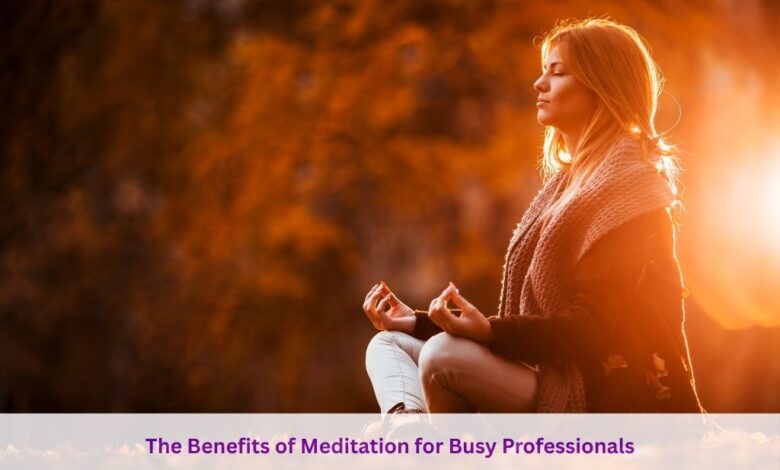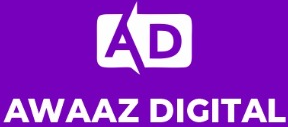The Benefits of Meditation for Busy Professionals

Professionals are under relentless demands in today’s rapid, hyper-connected environment. Emails overflow inboxes, meetings take over schedules, and the need to excel can result in burnout, stress, and even physical health problems. Meditation has shown itself as a scientifically supported, powerful instrument for boosting mental clarity, emotional stability, and general productivity in the middle of such turmoil. Meditation, once regarded as a spiritual or fringe hobby, now has a rightful seat in boardrooms and hectic calendars.
Why Professionals Demand Meditation More Now Than Ever
1. Unrelentless Stress and burnout
A natural result of corporate life is stress. The never ending cycle of deadlines, rivalry, and great expectations results in chronic stress, which worsens a broad spectrum of medical conditions ranging from anxiety and sadness to cardiovascular disease.
Meditation helps manage cortisol, the stress hormone. Research indicate that only a few weeks of daily meditation can significantly lower stress levels, allowing experts to handle obstacles with more calmness.
2. Information Overload and Decision Fatigue
Professionals are bombarded with information and expected to make dozens of decisions daily. This eventually causes mental tiredness and bad decision-making.
Meditation helps to improve focus and get rid of mental clutter. Training the brain to remain present improves attention span, lowers distractions, and enables professionals to make more conscious decisions.
3. Inappropriate Sleep Patterns
Late-night screen time, stress, and inconsistent schedules all impact sleep quality. Poor sleep results in diminished cognitive performance, irritability, and health problems.
Meditation stimulates the parasympathetic nervous system, hence encouraging relaxation and improved sleep. Methods like body scans or directed meditations before bed can assist unwind the mind and promote peaceful sleep.
Scientific-Backed Benefits of Meditation
1. Better EQ, or Emotional Intelligence
Professional settings depend critically on emotional intelligence. It improves leadership, empathy, conflict management, and communication.
Mindfulness meditation teaches people to watch their ideas and feelings without criticism. This self-awareness helps one’s capacity to grasp others, therefore strengthening emotional resilience and improving interpersonal relationships and leadership success.
2. Increased Productivity
Contrary to popular opinion, meditating actually boosts productivity rather than wastes precious minutes. A peaceful, concentrated mind enables more efficient and accurate speed.
Frequent meditation sharpens memory, focus, and problem-solving skills. Even brief sessions before important assignments can reset your mind and raise performance.
3. Superior physical health
Sedentary lifestyles and time restrictions cause experts to sometimes overlook their physical condition.
Meditation helps to lower blood pressure, strengthen the immune system, and reduce chronic inflammation. It promotes better habits and supports general well-being, therefore assuring that employees stay energetic and resilient.
4. Helps to improve creativity.
In many professional spheres, innovation is paramount. Anxiety and mental weariness stifle inspiration.
Meditation promotes an open and receptive mind. Approaches such open-monitoring meditation or visualization inspire new ideas and lateral thinking.
Genuine-Life Success Stories
1.Executives and CEOs number one:
Leaders of large companies like Salesforce, Apple, and Google openly support meditation. Salesforce CEO Marc Belief weaves mindfulness into the corporate culture. Steve Jobs attributed meditation for his innovative clarity.
2. Lawyers and doctors
Meditation enhances concentration and aids in the control of severe stress in demanding fields such medicine and law. Many experts in these areas do short meditation activities between surgeries or client appointments.
3. Teachers and Creatives
To improve teaching effectiveness, creativity, and emotional control, writers, designers, and educators use meditation.
Common Misconceptions on Meditation
“I have no time. “
Five minutes of meditation will provide advantages. The key is constancy, not duration.
“My ideas can’t be stopped. “
Meditation is about noticing ideas without becoming consumed, not about stopping them. Thoughts find natural settlement over time.
“It is a spiritual or religious custom. “
Meditation, although founded in spiritual customs, is now often used in secular contexts for both its physical and emotional health advantages.
Meditation for a tight schedule
Meditation calls for little radical lifestyle changes. Professionals can include it pragmatically as follows:
1. Approach the Day with Purpose
Start your emails five minutes of breath-focused meditation. This provides the day a quiet start.
2. Micro meditation Moments
To refocus, take quick meditation breaks 60 seconds of deep breathing between projects or conferences.
3. Traveling with purpose
If not driving, use commute time to listen to guided meditations or develop breath awareness.
4. Meditate before sleeping
Finish the day by doing a quick body scan or thanksgiving meditation to relax and promote sound sleep.
5. Employ Technology
Guided meditations geared especially for professionals are provided by apps like Headspace, Calm, and Insight Timer. YouTube itself offers free sessions of different lengths.
Beginner’s Meditation Technique: five Minute Concentrate Practice
1. Seek for a calm location free from interruptions.
2. Close your eyes and sit comfortably with your backbone upright.
3. Concentrate on your breathing. Inhale through your nose, exhale through your mouth.
4. Observe your thinking. Gently turn your mind back to your breathing when it stray.
5.Finish with thankfulness. Consider one item you are thankful for five minutes from now.
Consistency is more valuable than perfection. Show up daily; don’t judge your exercise.
The Role of Companies in Supporting Meditation
Forward-thinking businesses increasingly incorporate meditation as part of their wellness programs:
- Meditation break rooms in offices are quiet spaces.
- Regular mindfulness and stress management workshops
- Give yourself time for self-care pursuits including meditation or yoga by means of flexible schedules.
- Access to meditation apps or platforms counts as digital resources.
Companies that champion mental health gain from higher staff productivity, reduced absenteeism, and better employee mood.
Overcoming Difficulties in Preserving a Practice
Inconsistency:
It is usual to become restless. Every meditation, however it seems, is progress.
Absence of quick results
Meditation is akin to exercise; it takes time to develop the muscle. Trust the process.
Investing in Yourself: last but not least
Though frequently for clients, meetings, and family, busy professionals often give their time seldom for themselves. Though little, meditation is a powerful approach to grab a few minutes daily for your own well-being. From improved health and creativity to more clear thinking and emotional equilibrium, its advantages span every aspect of life.
In a world that values hustle, meditation reminds us of the power of stillness. Modern success demands a few minutes of daily breathing, pondering, and reconnection, not a luxury.
Therefore, stop, take a breath, concentrate. Nothing at all is the most effective thing you can accomplish today.
Meditation’s Influence on Professional Ties
Meditation improves professional relationships in addition to individual and productivity advantages. Tempers can flare under high-pressure conditions and misinterpretations are very usual. Meditation helps to develop a patient, empathic, active listening perspective qualities absolutely necessary for successful leadership and teamwork.
People become less reactive in challenging conversations when they use mindfulness to discover how to notice their own ideas and emotional triggers. This fosters more respectful and efficient contacts with subordinates, clients, and co-workers’. Meditating leaders are generally seen as more emotionally stable, approachable, and thoughtful in their reactions, hence fostering trust and rapport throughout their staff.
Corporate Case Studies: Meditating Businesses
Many major companies have already seen the value of mindfulness and included meditation in their corporate life.
Google trains employees in emotional intelligence and mindfulness using its “Search Inside Yourself” initiative. The program has won worldwide honours and shown how inside awareness results in outside achievement.
Nike urges staff members to take mental health breaks and provides meditation rooms inside their corporate buildings. These initiatives have raised personnel retention rates as well as morale.
Intel introduced its “Awake Intel” initiative, which incorporates meditations, conscious listening, and stress-reducing techniques. Workers noted a 66% improvement in emotional balance and stress management.
Meditation is a calculated investment in corporate health and employee performance, not only a wellness fad, as seen by these examples.
Meditation with Other Self-Care Activities
Meditation complements other self-care habits like journaling, physical activity, nutritious eating, and digital detoxing. For professionals looking for holistic well-being, incorporating meditation with these practices leads to a balanced lifestyle.
Showing more concern, A morning run followed by five minutes of mindfulness can help set the tone for an active and concentrated day.
After meditation, journaling enables more precise processing of ideas and feelings. Including yoga with breathing exercises and awareness fosters both physical and emotional flexibility. These behaviours taken together support busy executives develop resiliency, inventiveness, and long-term health.
All we can say Little Steps, Massive Effects
The rapid professional world seldom allows for pause. Few minutes of meditation, though, may transform meetings, emails, and deadlines. Meditation provides a calm haven that sharpens your mind, calms your nerves, and enhances both your professional and personal life whether you are a CEO, educator, freelancer, or healthcare employee.
Begin modestly. Keep steady. Your business as well as your future self will owe you thanks.
Your inner strength is your most valuable asset
The capacity to halt becomes a superpower in a society that seldom slows down. Meditation is about more deliberately interacting with reality rather than fleeing from it. For busy professionals, the advantages go well beyond just stress reduction. It helps to improve creativity, sharpen attention, control emotions, and develop resilience in the face of ongoing demands. You can too find value in moments of stillness, like many great leaders and pioneers over history. Meditation is wonderful since it finds you where you are. T
he straightforward act of breathing consciously can change your day whether you have two minutes or twenty. It just calls for a little dedication to your own mental well-being; no changes in career or schedule are necessary. And as you become more stable, composed, and informed, your work, relationships, and personal fulfilment will naturally start to match. Don’t neglect to feed the brain leading the race for success. Your capacity to stay present, clear, and balanced under pressure is ultimately your greatest advantage, not your job, degree, or productivity. That is the genuine professional benefit; meditating is the secret.




